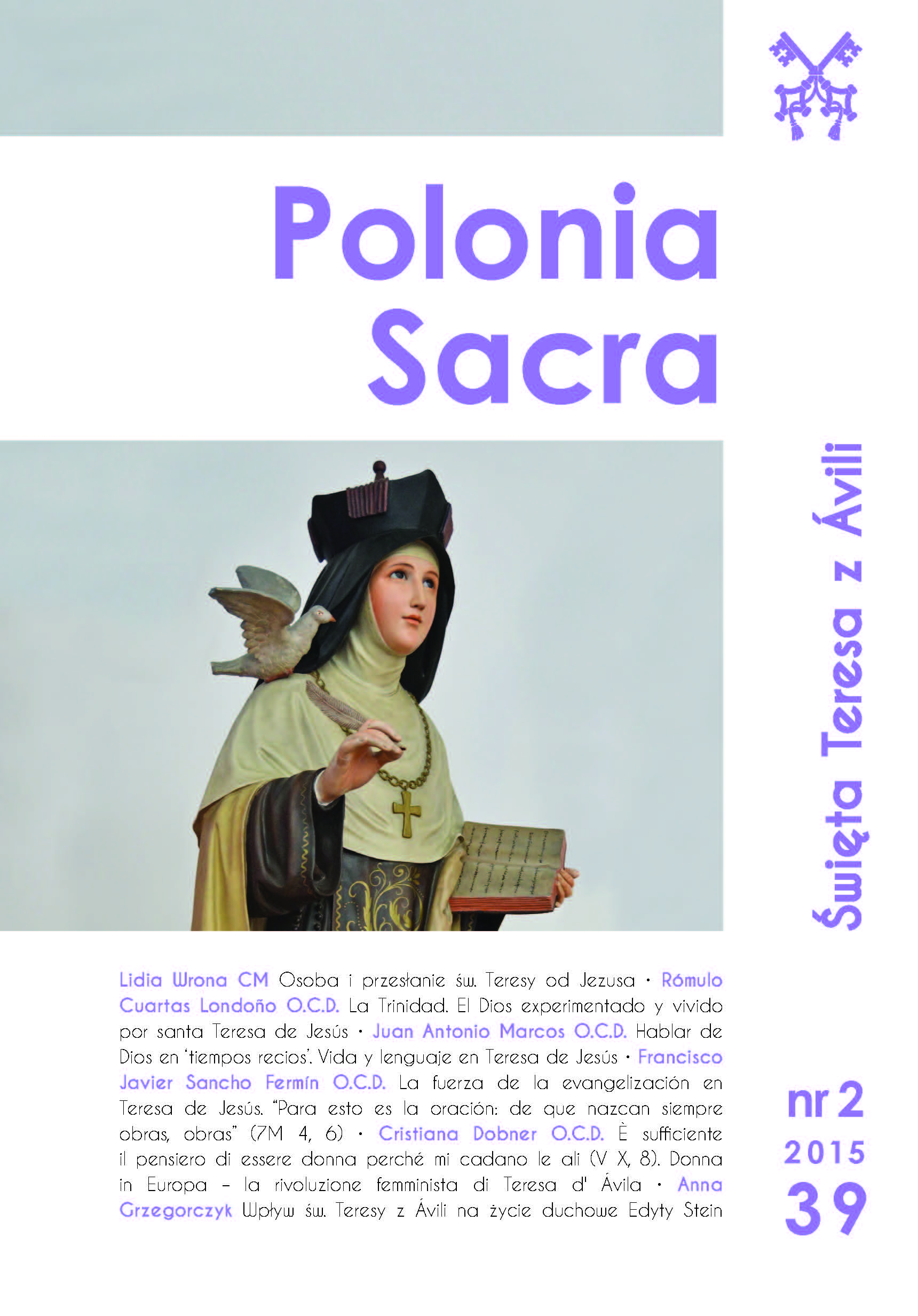È sufficiente il pensiero di essere donna perché mi cadano le ali (V X, 8). Donna in Europa – la rivoluzione femminista di Teresa d’Ávila
DOI:
https://doi.org/10.15633/ps.819Słowa kluczowe:
Diotima, subcultura, maternalità, la rivoluzione epistemologica, la lingua maternaAbstrakt
“É sufficiente essere donna perché mi cadano le ali” (V 10, 8). Questa eloquente affermazione di santa Teresa di Gesu è una perfetta testimonianza della mentalità che dominava l’epoca in cui viveva. Una attenta lettura dei testi Teresiani fa sorgere alcuni quesiti: Le sono veramente cadute le ali? Cosa ne pensa in realtà santa Teresa sulla donna, sulla Carmelitana? La riformatrice del Carmelo, ha iniziato a valutare le cose in modo personale senza preoccuparsi del giudizio degli altri. Ha iniziato la rivoluzione epistemologica e la continua nelle epoche successive. Oggi, l’ambiente feministico della “Diotima” la riguarda come una donna ideale.
L’articolo presenta i principii del suddetto ambiente, tocca la questione del linguaggio di Teresa, cerca di analizzare lo sviluppo della subcultura Teresiana e il suo impatto sull’epoca in cui viveva.
Bibliografia
AA. VV., Pautas historicas de sociabilidad femenina, rituales y modelos de representación, Actas del V Coloquio Internacional de la Asociación Española de Investigación Históricas de las Mujeres, Cádiz 1999.
Arenal E., Schlau S., Powell A., Untold Sisters. Hispanic Nuns in their own Works, Mexico City 1989.
Arenal E., Schlau S., “Leyendo yo y escribiendo ella“. The Convent as intellectual Community, JHP 13 (1989), pp. 214– 228.
Bergeret –amselek c., Il mistero delle madri. Un viaggio nel cuore della maternalità, Roma 2005.
Boella L., Pensare liberamente, pensare il mondo, in: Diotima 1990. Mettere al mondo il mondo, Milano 1990, Pp. 173–188.
Caravero A., Il pensiero femminista. Un approccio teoretico, in: A. Caravero, F. Restaino, Le filosofie femministe, Torino 1999, pp. 78–117.
Dictionary of women artists, ed. D. Gaze, Oxford 1997.
Dobner C., Fare Diotima, fare Teresa? Donne pensanti pratiche. XVI e XXI secolo, Roma 2006.
Dobner C., Teresa di Gesù: pensiero autobiografico o ego in relazione?, “Davar” aprile 2008, pp. 248–257.
Caravero A., Figure della corporeità, in: Filosofia Donne Filosofie, Milella 1994, p. 15 (Atti del Convegno Internazionale Lecce 27–30 aprile 1992), pp. 89–106.
Muñoz Fernandez A., Acciones e intenciones de mujeres en la vida religiosa de los siglos XV y XVI, Madrid 1995.
Muraro L., La nostra comune capacità d’infinito, in: Diotima. Mettere al mondo il mondo. Oggetto e oggettività alla luce della differenza sessuale, Milano 1990, pp. 61–76.
L’alfabeto delle sante, intr. a Scrittrici mistiche italiane, a cura di G. Pozzi, C. Leonardi, Genova 1988.
Putnam J., Smith E., The Lady: Studies in certain significant Phases of Her History, Ithaca NY 1910.
Rivera M., Feminismo de la diferencia. Partir de sí, “El Viejo Topo”, n. 73, Marzo 1994, pp. 31–35.
Rossi R., Perché tante “sviste” su Teresa D’Àvila, in: AA.VV., Le parole delle donne, Roma 1978, pp. 105–110.
Schulte van Kessel E., Vergini e madri tra cielo e terra, in: G. Duby, M. Perrot, Storia delle donne. Dal Rinascimento all’età moderna, Bari 1991, pp. 161–200.
Weber A., Teresa of Àvila. The rhetoric of femininity, New York 1996.
Pobrania
Opublikowane
Numer
Dział
Licencja
Autorzy publikujący w czasopiśmie udzielają jego wydawcy zgody o następującej treści:
- Autor zachowuje autorskie prawa majątkowe do utworu, a jednocześnie udziela wydawcy czasopisma zgody na jego pierwszą publikację w wersji drukowanej i wersji online na licencji Creative Commons Uznanie autorstwa 4.0 Międzynarodowe oraz zgody na wykonywanie opracowań, w tym przekładów.
- Autor ma możliwość udzielania zgody niewyłącznej na opublikowanie utworu w wersji, która ukazała się w czasopiśmie (np. zamieszczenia go w repozytorium instytucjonalnym lub opublikowania w książce), wraz z informacją o jego pierwszej publikacji w czasopiśmie.
- Autor może umieścić swój utwór online (np. w repozytorium instytucjonalnym lub na swojej stronie internetowej) jeszcze przed zgłoszeniem utworu do czasopisma.

